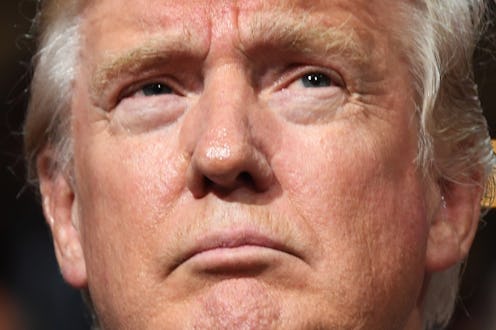News
Not Even The Constitution Stumps Trump
In an interview given late Wednesday night, the Republican nominee for president told The New York Times that he Trump wouldn't unconditionally support the United States’ NATO allies. This is the latest demonstration by the real-estate-mogul-turned-Republican Presidential nominee of his reckless character, lack of understanding of international diplomacy, and disrespect for the Constitution. You know, qualities we all want to see in a president.
But what at first blush just seems like bluster — and Trump has offered us no shortage of bluster during this campaign — actually cuts much deeper to the existential vacuum at the heart of Trump’s central guiding philosophy: whatever Donald wants, Donald gets. Anything that gets in the way, be it Ted Cruz, Hillary Clinton, or even the Constitution of the United States itself (and, hey, let’s throw history and logic on the list), is disposable.
First, a quick refresher in case you’re not up on your international diplomatic relations: the North American Treaty Alliance (NATO) was created in 1949, and included 12 member states, including the U.S., England and France. Its purpose was to protect Europe against attacks by declaring that “an armed attack against one or more” member country “shall be considered an attack against them all.”
Originally, the treaty was meant to safeguard Europe from invasion by the U.S.S.R. during the Cold War, an important objective for the U.S., hoping to curb the spread of Soviet Communism. The treaty worked through to the Soviet collapse of the early ’90s, but the recent aggressiveness of Russia’s president Vladimir Putin reinforces NATO’s importance.
Donald Trump’s tepidity towards NATO shows his poor understanding of contemporary history and his narrow-minded view of international diplomacy. Others have already pointed out how Trump’s comments are great news for Putin and terrifying for eastern European NATO member states.
But I think it’s important to probe a step deeper: what does it mean that Trump wants to only conditionally enforce the United States’ Treaties? Not to get too educational here, but it’s worthwhile to remember that Article VI of the U.S. Constitution states that “This Constitution, and the Laws of the United States which shall be made in Pursuance thereof; and all Treaties made, or which shall be made, under the Authority of the United States, shall be the supreme Law of the Land” (emphasis added). Trump is essentially giving the finger to the Constitution — this coming amid a week where GOP politicians kept saying he will uphold it.
If you think that’s messed up — and it is — then I have bad news: philosophically it gets even worse. We’ve long known Trump is ready and willing to renege on promises, but what this shows is that not even the Constitution can hold Trump down. It’s almost as if he loves this country so gosh-darn much that he’s willing to betray every last principle of it in order to “make America great again.”
Or, let’s put it another terrifying way: if Trump wins, and he takes the oath of the presidency, what will his words even mean? What force will the Constitution have? We already know that Trump favors making it easier to sue the press, but I wouldn’t be surprised if we end up seeing laws prohibiting sedition.
Too often it becomes easy to think of this election as a struggle between Democrats and Republicans, between liberals and conservatives, or even just between evangelicals and people who believe they should get to do what they want with their bodies. But this election is quickly surpassing all of those contests in its profundity: it’s no longer a contest between Donald Trump and Hillary Clinton. This has become a fight of meaning versus impulse, of our executive function versus our reptile brain, of civilization versus savagery.
Of course, there are checks and balances in our Constitution which might curb a runaway Trump, and many have persuasively argued that he could be kept in check. But if his disdain for the U.S. Constitution and his inability to keep a promise are anything like similar attributes in the world leaders he admires, I’d just as soon avoid putting the Constitution’s checks and balances to the test.
